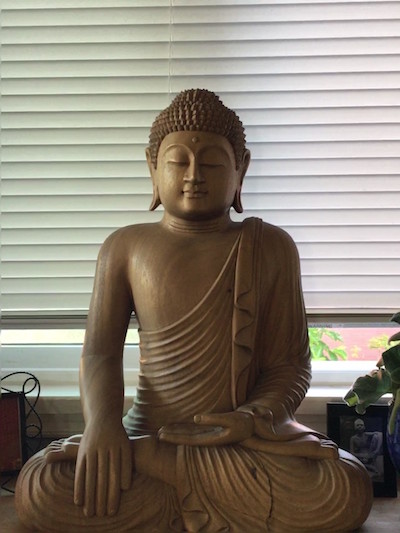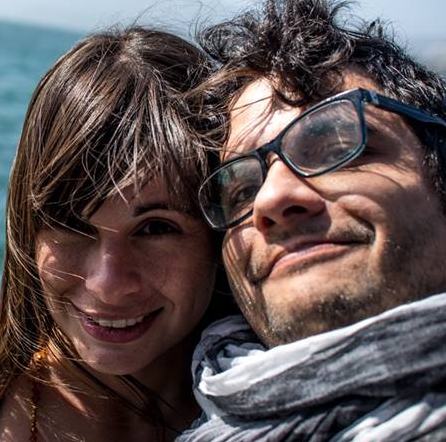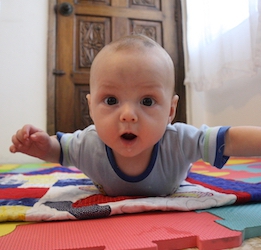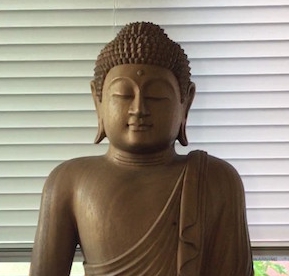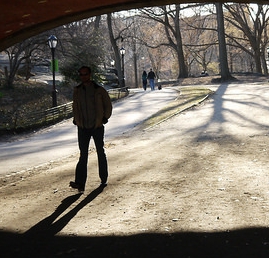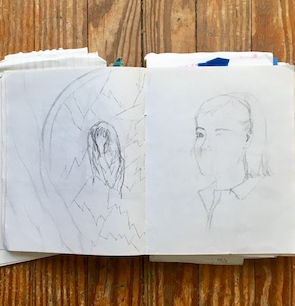A stranger drained a beer on my couch in Santa Monica while I led a Buddhist meditation group in northeast L.A. Apropos of the New Year, we discussed how intentions precede actions, and how the mind, in formulating them, seeks permanence and reliability in a world that lacks both. I always drive too fast when I leave – longing for home – but at some point in the drive west, I loosened my grip on the steering wheel, relinquished the passing lane, and glided in. As I crested the stairs, I noticed the paint peeling on the landing, the struggling bamboo, the fat Chinese Buddha. I did not see the bathroom window screen, torn and dangling, nor the scuff marks on the siding.
When I opened the door, the smell of patchouli assaulted me. I couldn’t recall making the black marks on the couch and wondered how a raccoon or a dog might have gotten in. Stay up for a minute OK? I texted my boyfriend Mark. Something strange in my apartment. I left the front door open. Mark called, and with him on the phone I checked the kitchen – nothing – and walked to the bedroom. In the ambient light, I saw the form of a man face up on the bed, hand on his belly, surrounded by a halo of hair. He reeked of patchouli. One leg dangled to the ground, and the other was propped up beside him. He was snoring.
“There’s a man asleep on my bed.”
Mark replied with three rapid-fire sentences. The first, Get out of there, registered like a mantra – get out of there get out of there get out of there – as I shot out of the house and down the stairs. I stopped in the driveway, in view of the front door, and repeated the third sentence, I’ll be right over, to myself, as I tried to work out how to force the man from my bed. But Mark had said something in between. Get out of there and… and…. Call 911. Ah. Good idea.
I had lived in the apartment only a few months; my bed was on the floor, books were in boxes, pictures needed framing. I moved after ending a twelve-year relationship with Scott, a decent, financially supportive and intelligent man with whom I was little more than roommates. What bound us was the home we had built together, literally. I had spent weeks staining the walls and choosing chandeliers and fixtures, months designing and installing the kitchen and greywater system, years creating the garden. During renovations, I contemplated prospect versus refuge, the complementary architectural principles that manifest both an enclosed sense of safety (refuge) and a platform for observation and exploration (prospect). After years of work, the house was a validated success, featured in Venice Beach’s prestigious home and garden tour, but despite its soaring ceilings, open floor plan, and wall of glass-paneled doors, it was, for me, too much refuge. I settled, settled, like a shell into mud.
Salmon Fishing in the Yemen shook me from my refuge-laden stupor. In the movie, Ewen McGregor takes a chance on an impossibly idealistic project, realizes his dream, and scores Emily Blunt. A cheesy story about hope and love and possibility. Driving home with Scott afterward, I was bursting with desire for the daring of that improbable life. Scott met my excitement with his usual reticence; nothing in him was tuned to me. As we sunk back into a familiar silence, I perceived, for the first time, the fragility of our connection and realized with urgency that I could not continue. The feeling remained acute for days, lingered for weeks. And yet it took me two more years to end it. Years. Because I had a home, I suppose: a shared newspaper on Sunday mornings, definite plans for Christmas, a reason to cook for two. I was someone’s emergency contact. Refuge.
Fifteen minutes after I called 911, two police officers disappeared into my apartment and a third took my statement. I answered calmly, but when we heard that they had found a large kitchen knife in the man’s possession, I buried my head in Mark’s chest. A muted understanding broke through the fog of my disbelief that the evening could have unfolded differently. It only lasted a moment.
“Is he OK?” I heard myself ask.
“Is who OK?” the officer returned.
“The intruder.”
He didn’t answer.
The man escorted from my apartment was over six feet tall, with a shock of frizzy hair and a dirty suit and tie. He sat, cuffed, on the ground, his head down, collapsed into himself. When they shone a flashlight in his face so I could identify him, he closed his eyes and held up his chin, simultaneously proud and resigned. I wished the cops would let him go. He hadn’t hurt me, and I didn’t want him to suffer. It seemed he and I were in this harrowing ordeal together. The officers had a different perspective. They discovered that he was on parole for burglary and were efficient in his arrest.
Inside my apartment, we found grime on the counters and windowsills. The empty Budweiser can sat next to a rifled-through bag of my costume jewelry. They advised me to throw away my bed linens. They found him with three of my 50-cent rings on his fingers and two pairs of my dirty underwear around his penis. On the dresser next to my bed lay a pair of headphones and an old stick of hair gel – both mine – next to his kitchen knife.
In a fit of impeccable timing, I had split up with Scott while jobless. He insisted I move out immediately, and I spent two months cobbling together house-sitting arrangements, relying on the kindness of near-strangers. I attended to what was right in front of me: the morning job search, the evening schlep to yet another unfamiliar home. During my itinerancy, a growth on my dog’s spine required emergency surgery that revealed a malignant tumor requiring radiation. My home, finances, identity, even my pet had fallen apart. In prime Buddhist form, I resisted and complained. I hated the blank slate of the future. In rare vulnerable moments, I felt rudderless and depressed; mostly, I was angry or panicked. I seemed to have retained nothing of the Buddhist teachings I’d studied for years. I began to dread meditating and often skipped my daily practice.
There’s an allegory, Christian I think, about a hiker lost in a wood after dark near the edge of a cliff who accidentally stumbles off. In mid-air, in the pitch dark and fearing for his life, he flails, desperate for something to hold. When a tree branch presents itself, he clings to it to stop his fall and hangs there, growing weary, through the night. As daylight seeps in, he sees that he is inches from the ground. His struggle was for naught. God is the ground, and the branch the worldly things to which we cling. Safety awaits if we will only let go.
I love stories like this, with their sledgehammer symbolism, the kind that riddles my dreams. I especially like the Buddhist spin, in which the ground is not right below our feet, obviating the need to cling. God is not ready to catch the faithful. Instead, there is simply no ground at all. The fall is all there is.
The night of the break-in I slept at Mark’s, then arranged to have my apartment professionally cleaned. Housekeeping angels sprayed aromatherapeutic cleanser into every corner and tossed the sheets and duvet cover in the dumpster. A specialist steam-cleaned the couch. Still, that evening I wiped black goo from the bedroom wall next to my pillow. I smelled phantom patchouli for days. The man appeared behind the shower curtain and out the bathroom window. The calm I had wrapped around myself during the arrest began to erode. In a word, I was freaked. Not an embodied, pit-of-the-stomach fear, but a vibration in the head. If you had asked, I would have answered honestly that I was not afraid.
After a few weeks, my acute symptoms abated. The apartment smelled like the scented candle I had burned or the dinner I’d cooked. The man no longer materialized in front of me. A fog still permeated my consciousness – a cool and muted unease – until I began to believe in my own equanimity. Then, lying on the couch, I noticed three smudges on the side of the window frame. Fingerprints, surely his. The insecurity of that night flooded back. The tendrils of denial threaded through my mind were suddenly in tension with this fresh proof of the violation. This time, I wasn’t ready to succumb to forgetfulness. I didn’t wipe the prints away. Every time I saw them, a part of me was back to falling in the dark.
Marilynne Robinson nailed this fundamental uncertainty in her novel Housekeeping, in which two sisters left in the care of their wandering, eccentric aunt Sylvie grow up in a house in precipitous decline. In the end the house falls apart, and Sylvie takes one of the girls with her into an adulthood of itinerancy. Even as we nest in our houses and inside the shelter of our families, we are always, Robinson reminds us, losing ground.
For ten months I drifted between forgetting and falling. Then one night, a loud bang woke me from a deep sleep. Half-dreaming, I opened my eyes to a massive form in shades of night lumbering through the doorway toward me. Adrenaline surged, my heart pounded, and I screamed – a high-pitched thing, direct from a horror movie. A panic-sodden wail. I don’t think I screamed aloud – the neighbors would surely have heard – but the one in my head was unlike anything I’ve known. During the scream, I couldn’t see; the sound overpowered my other senses. It blew the fog away. It woke me up. The menace in the doorway dissolved, changing from opaque to transparent as I surfaced from the dream and resolved the empty hallway. A smoke detector had fallen from the ceiling onto the wood floor. The next morning, I kept skirting the broken thing, afraid to touch it, as if the phantom would appear again, genie-like, from its plastic slits. It was hours before I picked it up and threw it away.
Since the break-in, I’ve slowly made the apartment my own. I installed a security system, bought bookcases, framed and hung my favorite pictures. I started meditating again, on occasion, on a zabuton in the living room. Architecturally, the apartment offers refuge – small rooms with cozy furniture – but I stay for its prospect. It perches above an unused garage, windows on three sides, light everywhere. It borrows views of an Italian cypress, the neighborhood palms, both the sunrise and sunset. I call it my aerie.
I still haven’t washed off the fingerprints. They remind me that things fall apart. The dream house will be lost, and the rest will be violated. There will be black smudges on the walls and sills. My personal effects – a mood ring I wore when I dressed as Janis Joplin, the body spritzer I found at the spa in Big Sur – will be co-opted by a stranger with a knife and a history of breaking and entering. And I will suffer in the falling, the truth of insecurity a terrifying force that powers my dreams. We will come to “the end of housekeeping,” Robinson reminds us. Things are provisionally ours. Relatively, temporarily, delicately ours. True refuge is a scam.
Jennifer Carson is a novelist, essayist, and book critic. Her work has appeared in the Los Angeles Review of Books, Barnes & Noble Review, and Science, and is forthcoming the anthology Waves: A Confluence of Women’s Voices. She holds a Ph.D. in astrophysics from UCLA and is earning an MFA in Creative Writing and Literature from Bennington College. She lives in Santa Monica, CA
